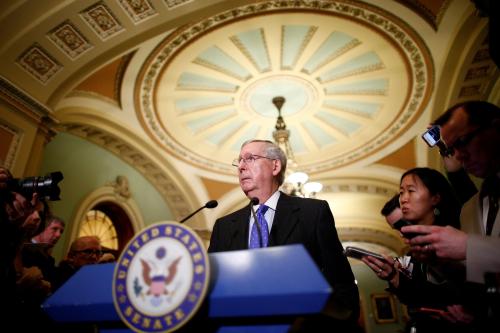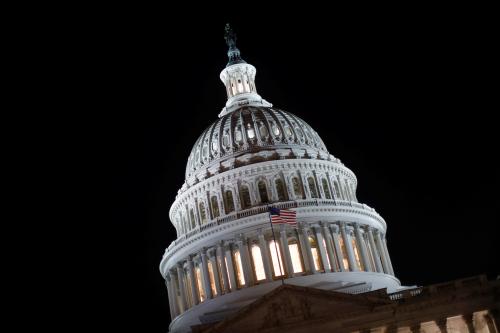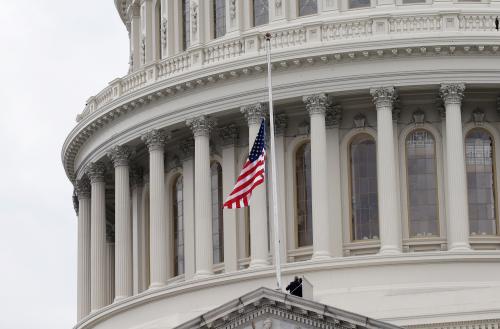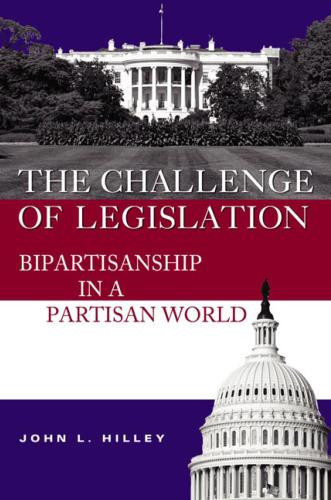One rare point of consensus across the ideological spectrum is that the congressional budget process is broken. The House has failed to pass a budget the last two fiscal years. The Senate is even worse, passing a budget only two of the last seven years. And despite recent headlines, the problem is not always budget disagreements between the two chambers. Lately, the chambers do not even make an attempt to reconcile them.
Budgets offered by both parties have morphed from honest funding proposals to party position papers. Contemporary budget proposals are used as ideological wish-lists that are not expected ever to face a vote, much less to pass. Put directly, budgets have become messaging documents, not the instigators of difficult budget decisions.
For example, Republicans released a budget in 2011 that promised reforms to Medicare and Social Security. It was a bold statement that had no teeth. No serious action was taken on these proposed changes. A few years earlier, Democrats released a budget promising middle-class tax relief, but failed to start reconciliation to help ensure its passage. These efforts were signals to their respective bases, rather than the start of a process to fund government programs.
Though often the culprit of all Congress’ dysfunction, the neutered budget process is not due to hyperpartisanship. Instead, the toothlessness of today’s budgets has to do with the parties’ goals, which have less to do with governing and more to do with winning elections. Hyperpartisanship cannot explain why the House Republican conference, consisting of more than 240 members, can’t find 218 votes to pass their budget. Partisan polarization also cannot explain why the Senate often decides not to debate a budget at all.
Intraparty squabbles—not the interparty disagreements that are more regularly blamed—often fracture the majority party’s ability to coalesce behind specific policy proposals. As recently seen with the multitude of Affordable Care Act repeal efforts, what gains the support of moderate Republicans often costs votes from more conservative members. Agreement within the caucus on broad policy positions is one thing. Consensus on policy details are quite another. The same dynamic is at play with decisions of funding levels.
Leaders of both parties also generally have made the decision to refrain from reaching across the aisle. Rather than bargain with Democrats, or vice versa, congressional leaders have instead opted to not pass a budget at all. Leaders have calculated there is more to lose electorally by negotiating than to gain by funding the government.
What’s more, party leaders have avoided potentially difficult votes on the House and Senate floor. They want to protect their members from having to explain politically painful budget choices. It’s a tactic of evasion and cowardice in an effort to hold onto fleeting power. Again, the threat of negative electoral consequences has outweighed the importance of forcing members to make governing choices on the record.
The irony is that funding for the next fiscal year will need a bipartisan negotiation, as previous funding decisions have typically required. With the sequester in place, Democrats and Republicans will need to lift limits on discretionary spending in order to enact some version of their party’s priorities: Republicans need to raise caps for defense spending and tax reform, while Democrats need to raise caps for nondefense spending. Should Congress again fail to produce an agreement, neither party wins. Agencies and programs that constituents rely on will go underfunded or unfunded altogether. Consequently, Washington’s political brinksmanship will yet again result in constituents feeling the brunt of congressional dysfunction.
Congress is failing to do its job in large respects, particularly when it comes to government spending. But the common culprits of partisanship and polarization are not the root cause. Leaders in Washington have instead opted to avoid making these choices at all, leaving the nation to lunge from one shutdown or debt crisis to another, afraid of losing base support and fleeting majorities. Until politics stops rewarding the most extreme interests on either side of the aisle, even more of our government’s decisionmaking mechanisms will become more symbolic and less bold.
The Brookings Institution is committed to quality, independence, and impact.
We are supported by a diverse array of funders. In line with our values and policies, each Brookings publication represents the sole views of its author(s).










Commentary
Congress’s vanishing budget: It’s not all polarization’s fault
October 12, 2017